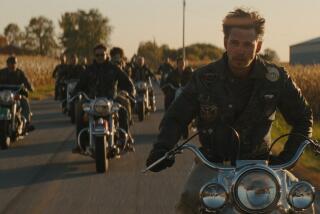Trampling boundaries in ‘Lonely’
- Share via
Although its opening shot, in which a cowboy’s slumber is disturbed by the roar of jets overhead, announces “Lonely Are the Brave” as an elegy for the western, the movie is in some ways more powerful as a harbinger of 1960s counterculture.
Released in 1962, it was adapted from the novel “Brave Cowboy” by Edward Abbey (who also wrote “The Monkey Wrench Gang,” the book that became a foundational text of the eco-sabotage movement), with a script by Dalton Trumbo, who only recently had emerged from the shadow of the blacklist. Orchestrating this gathering of enemies of the state was Kirk Douglas, who two years earlier effectively had broken the blacklist by hiring Trumbo for “Spartacus.”
Given his lineage, it’s not surprising that Douglas’ character, itinerant cowhand Jack Burns, is something of a professional troublemaker. Self-assured to the point of cockiness, he lives by a simple creed: “Do what you wanna do, and the hell with everyone else.” Unfortunately for this ragged individualist, the frontier is closing down, paved over to make way for convertible cars and tractor-trailers full of portable toilets.
When Jack finds out an old friend has been jailed for helping Mexican immigrants cross into New Mexico, he arranges to have himself thrown in jail by picking a fight with a surly one-armed drunk (Bill Raisch, who would go on to menace Richard Kimble on the TV series “The Fugitive”). Their knockabout brawl is a remarkable feat of brute choreography, both genuinely dangerous and irresistibly enthralling, and a showcase for director David Miller’s unobtrusive, observational style.
Getting into jail proves easier than getting out: When the police threaten to let him go with a warning, Jack slugs a deputy, turning a 30-day charge into a yearlong sentence, and then, after he’s said hello to his friend and gotten pummeled by a sadistic guard (George Kennedy, prefiguring his role in “Cool Hand Luke”), he escapes, an offense that carries an even stiffer penalty. But for Jack, confinement is a fate worse than death.
The movie’s last act is set in the mountains, where Jack and his trusty steed climb ever higher in flight from a growing swarm of police, dispassionately watched over by Walter Matthau’s ambivalent sheriff. Even as he outwits the officers, evading their gaze or shooting down an Army helicopter without harming its passengers, the logic of his path is inescapable: He can climb only so high before he starts going back down.
As he makes his way up the slope, Jack briefly comes face to face with a mangy mountain lion -- like him, a once-proud creature who seems to have found the last place left where he can live in peace.
Like its fence-hopping hero, “Lonely Are the Brave” enthusiastically disregards boundaries. Douglas, his movie-star charisma at full glow, plays his most sustained and layered scenes opposite Gena Rowlands, whose seamless naturalism brings out a side of Douglas unseen elsewhere. The movie itself straddles, not always successfully, the line between sweeping allegory and tactile grit.
Although the film never goes long without a bit of comic relief, or at least one of Douglas’ blinding grins, it has moments of muted savagery. (It could have been harsher: In his script notes, Abbey suggested a shot in which a dog’s corpse is progressively ground into the highway by a stream of passing cars.)
The leaden irony of its last reel, foreshadowed by periodic cuts to Carroll O’Connor behind the wheel of his privy-bearing semi, is overcome by the violent conclusion of Jack’s escape plan and the faraway look in his wide-open eyes.
There are times when “Lonely Are the Brave” could use a bit more of the cowboy spirit. The exchanges between Matthau and his bumbling deputy feel like sitcom banter designed to placate audiences who might otherwise mistake the movie’s pessimistic underpinnings. Some boundaries fall, and others stay firmly in place.
--
More to Read
Only good movies
Get the Indie Focus newsletter, Mark Olsen's weekly guide to the world of cinema.
You may occasionally receive promotional content from the Los Angeles Times.










